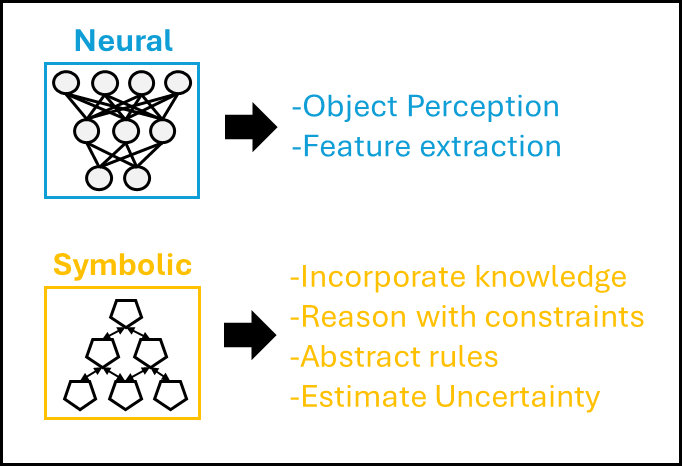What you will do. Every time we use an application relying on Artificial Intelligence (AI), this AI model needs to be computed somewhere, whether on a distant server,
or directly on a dedicated chip in our embedded devices (phone, laptop, etc.). Yet, as the performance of deep learning models (the standard for AI today) increases,
the size of these models explodes. This creates increasingly intensive tasks even for dedicated AI processors, in terms of computation and memory. In this context,
creating a new generation of AI models able to reason more effectively and using less power requires to explore alternatives to deep learning. One of these promising
alternatives is called Neurosymbolic AI, which combines neural networks with symbolic reasoning (such as probabilistic models or hyperdimensional computing),
allowing to increase the reasoning abilities of the model while being more compact in size. However, in terms of hardware acceleration, the neural and symbolic parts of the models
have very different requirements in terms of computation and memory, which makes the architecture and design of accelerators very challenging. This is exactly this challenge
that we tackle in this PhD work, in a close collaboration between UC Louvain (Prof. Martin Andraud) and KU Leuven (Prof. Marian Verhelst). In this PhD position,
you will explore new digital integrated circuit (IC) architectures and design techniques to build complete accelerators for neurosymbolic AI, using cutting edge technology
and based on our recent results in the area. This will require a combination of design space explorations, architectural research, HW-algorithm co-design, digital design, and system integration.
NOTE: This PhD position is shared at 50% between the two teams i.e. 2 years at UCLouvain and 2 years at KU Leuven.
What we offer you.
(1) An exciting working topic. You will develop competences at the interface between IC design and embedded AI. You will think about research solutions for emerging models and architectures
and integrate them with embedded RISC-V co-processors;
(2) The use of cutting-edge IC design tools. You will design ICs in the latest nanometer-scale CMOS technologies, participate in multi-project wafer runs annually
and use a state-of-the-art measurement lab.
(3) A supportive working environment. You will integrate two international and supportive research teams at UCLouvain and KU Leuven.
You will be in touch with a vast network of academic and industrial partners, living in Belgium, at the heart of innovation in IC design and AI in Europe.
Who you are.
- You have a master’s degree in electrical engineering. High average grades as well as excellent grades on courses on electronics are a clear asset.
- You just obtained your degree, or you already gained some industry experience.
- You are passionate about IC design and AI, you want to work on a multi-disciplinary topic.
- You have some hands-on experience or courses taken on IC design and tools (in particular Cadence). Specifically, experience and/or interests in analog/mixed-signal ICs are an asset.
- You are open-minded for new research, eager to learn more and fit to teamwork.
- You are fluent in English, and possibly in French/Dutch.
More information? Do not hesitate to contact me via Email (see below)
Ready to apply?
Please submit your application by Email, martin.andraud(at)uclouvain.be. Please include the following documents in English (or French):
- Application letter (1 to 2 A4 pages)
- Course transcripts of Master studies with grades and Certificate of Master degree
- Curriculum Vitae (including list of publications if any, 1 to 2 A4 pages)
- Possible References (names of referees or recommendation letters)
